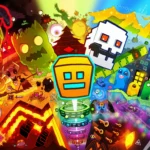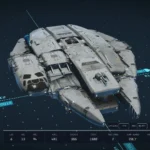Is Starfield Good or Bad? That is the burning question on the minds of gamers everywhere. As we eagerly await the release of Bethesda’s highly anticipated space exploration game, we can’t help but wonder if it will live up to the hype. Will it be a stellar adventure that transports us to a whole new universe, or will it crash and burn like a failed rocket launch? In this blog post, we will delve into the world of Starfield, comparing it to fan-favorites like Mass Effect and Outer Worlds, and ultimately determine whether it is a cosmic triumph or a celestial disappointment. So buckle up, fellow space enthusiasts, as we embark on this intergalactic journey to uncover the truth about Starfield.
Starfield: A New Universe to Explore
Embarking on a cosmic odyssey, Starfield emerges as a celestial canvas painted by the acclaimed artisans at Bethesda Softworks. This action role-playing game beckons adventurers with the promise of uncharted galaxies and the allure of discovery. But how does it measure up to the grand expectations set by its venerable developers?
| Starfield Fact | Detail |
|---|---|
| Developer | Bethesda Game Studios |
| Publisher | Bethesda Softworks |
| Game Type | Action Role-Playing |
| Setting | Space-Themed Universe |
| New Intellectual Property | First in 25 Years |
Marking a quarter-century milestone, Starfield is not just another title; it’s a testament to Bethesda’s enduring legacy of world-building excellence. With the game’s footprint stretching across galaxies, one questions whether it embodies the depth and innovation gamers have been yearning for. Does it hold a candle to the cosmic tales we’ve traversed, or does it eclipse its predecessors, casting a shadow of awe and wonder?
The anticipation has been simmering for years. Details have trickled out, painting a picture of a game that’s not just a playground for interstellar escapades, but a narrative-rich experience. Players yearn for a game that not only entertains but resonates on a personal level. Starfield promises to be such a journey, weaving a tapestry of stories against the backdrop of the vast, unforgiving cosmos.
As explorers set their sights on the stars, the question looms: Will Starfield deliver a universe brimming with life, lore, and the untamed beauty of space? Or will it merely be a fleeting comet, dazzling momentarily before fading into the void of forgotten titles? The gaming community watches with bated breath, eager to chart their own paths among the stars.
With a legacy to uphold, Bethesda’s latest venture stands at the precipice of history. It’s a bold leap into the unknown, where every planet, space station, and asteroid could tell a story. The promise of Starfield is not merely one of exploration but of creation—where each player’s journey becomes a unique narrative etched in the annals of gaming chronicles.
As we brace for the voyage into Bethesda’s latest cosmos, we cling to the hope that Starfield will not only meet but exceed the lofty expectations it has set. With the studio’s pedigree and the game’s ambitious scope, the potential for a stellar odyssey is within grasp. The question remains—will it soar among the celestial bodies, or drift aimlessly in the vacuum of space?
Starfield: A Wannabe Mass Effect/Outer Worlds Game?
Labeling Starfield as a mere echo of Mass Effect or The Outer Worlds might seem easy at first glance, given the shared canvas of interstellar adventure. Yet, this comparison merely scratches the surface of what Starfield has to offer. Venturing deeper, one discovers that Bethesda Game Studios has infused this space odyssey with its signature style, creating a game that is both familiar and refreshingly original in its execution.
The World Building in Starfield
When it comes to the art of crafting immersive worlds, Bethesda’s prowess is undisputed, and Starfield is a shining example of this expertise. Players are invited to explore a tapestry of hundreds of planets, each with its own distinct ecosystems, cultures, and mysteries. Every celestial body in Starfield is meticulously detailed, from the rugged terrain of dusty, moon-like surfaces to the lush, verdant landscapes of more habitable worlds. This attention to detail ensures that the journey across the stars is not just about the destination, but about the wonders encountered along the way.
Quest Design and Customization in Starfield
The quest design in Starfield is a testament to Bethesda’s commitment to delivering a rich RPG experience. Each mission, be it a pivotal moment in the main storyline or a detour into the myriad side quests, is crafted with intent and purpose. The narratives woven throughout these quests are designed to captivate, challenge, and reward players, compelling them to delve deeper into the mysteries of the cosmos.
Customization in Starfield extends far beyond aesthetic choices, allowing players to tailor their character’s abilities and playstyle to their preferences. Fans of RPGs will appreciate the granular control over character development, from selecting skills and traits to choosing alliances and moral stances. This level of personalization ensures that no two playthroughs are the same, offering a bespoke gaming experience that evolves with each decision made.
In the grand tapestry of space-themed RPGs, Starfield emerges not as a wannabe, but as a bold statement of Bethesda’s vision for the future of the genre. With its blend of awe-inspiring world-building, intricate quest design, and profound customization options, Starfield sets a new benchmark for what it means to embark on a digital space odyssey.
Quality Comparison: Starfield vs Mass Effect and Outer Worlds
In the vast cosmos of sci-fi gaming, Starfield has carved out its own orbit. It’s only natural for aficionados to draw parallels with the legendary Mass Effect series and the vibrant The Outer Worlds. Yet, such comparisons, while useful, may not always do justice to the unique constellation of features each game offers. As an avid gamer with a deep dive into all titles from Bethesda, I’ve witnessed firsthand the compelling universe Starfield presents.
Starfield boasts an expansive narrative canvas that is both familiar and innovative, a juxtaposition that has engendered a loyal following. Its ability to stand shoulder-to-shoulder with such titans as Mass Effect and The Outer Worlds speaks volumes of its quality. While each game has its own distinct flavor, Starfield’s dedication to an immersive experience is evident in the attention to detail within its worlds and its quest complexity, which are tailored to captivate and reward inquisitive players.
Personalization in Starfield extends into the very fiber of gameplay, allowing players to mold their journey not only through aesthetic choices but also through a refined customization system that shapes their character’s skills and approaches to challenges. This level of player agency is a testament to Bethesda’s expertise in creating rich, interactive environments that resonate with gamers’ desire for meaningful choice.
Starfield: A Success Story
Despite the cacophony of critiques, the launch of Starfield has been nothing short of stellar. Its gravitational pull keeps it fixed as the third most played title on Xbox, reflecting its enduring appeal. As a beacon of innovation, it is hailed as one of the most significant exclusive IP debuts of the current console era. The game’s success can be credited to its engrossing narrative, the depth of its gameplay, and the sheer breadth of its meticulously crafted universe.
Players have embraced Starfield’s invitation to chart their own paths across the stars, driven by the game’s robust mechanics and rich storytelling. Its ascent in popularity demonstrates Bethesda’s ability to not only meet but exceed players’ expectations in delivering a riveting space-faring RPG experience.
Visiting Earth in Starfield
Among the constellation of features that set Starfield apart is the opportunity to set foot on Earth—a rarity in space exploration titles. This terrestrial excursion occurs early, during the game’s second mission, offering adventurers a touchstone amidst the celestial unknown. Earth serves as both a nostalgic backdrop and a pivotal point in the game’s expansive narrative, grounding the experience in a sense of home and humanity while also propelling players into the uncharted vastness of space.
The inclusion of Earth in the gameplay experience not only enriches the narrative but also provides a unique juxtaposition against the alien landscapes players will encounter. It’s a bold design choice that underscores Bethesda’s commitment to delivering a space odyssey with both breadth and depth, a journey that starts from the familiar and stretches into the fantastic.
Conclusion: Is Starfield Good or Bad?
The verdict on Starfield is not a simple binary; it’s a complex tapestry woven from the threads of individual tastes and gaming preferences. For aficionados of space exploration and intricate world-building, Starfield represents a shining beacon in the cosmos of gaming. It offers a universe brimming with engaging quests, a wealth of customization options, and a level of detail that can immerse players for hours on end.
On the flip side, those gamers who have their hearts set on an experience akin to Mass Effect or Outer Worlds might encounter a different reality. While Starfield shares a genre with these beloved titles, it charts its own course through the stars, offering a distinctive take on space RPGs. It may diverge from certain expectations set by its predecessors, but it provides its own brand of narrative depth and gameplay innovation.
It’s crucial to note that Starfield’s success doesn’t hinge on it surpassing every other game in its category. Instead, its triumph lies in the uniqueness of the adventure it presents. From the meticulously detailed recreation of Earth to the vast expanses of uncharted space that players can explore, Starfield has carved out a niche that is exclusive to Bethesda’s vision of the final frontier.
For a comprehensive appraisal, potential players and enthusiasts should consider perusing reviews and insights from trusted sources such as Gideon’s Gaming and Metacritic. These platforms provide a spectrum of opinions and analyses that can help determine if Starfield aligns with your personal gaming predilections.
In conclusion, the question of whether Starfield is good or bad is not one that can be answered universally. This game, like a distant galaxy, is waiting to be explored and understood from various vantage points. Whether it becomes a cherished memory like a favorite constellation or a fleeting comet of interest will depend greatly on the individual player’s journey through its stars.
FAQ
Q: Is Starfield gameplay good?
A: Yes, according to the latest critic reviews, Starfield is considered to be an excellent RPG experience. While it may have weak spots and not push many boundaries, it excels in world building, quest design, and deep customization.
Q: Is Starfield better than No Man’s Sky?
A: Starfield and No Man’s Sky offer different strengths. Starfield focuses on storytelling and quests, providing an engaging RPG experience. On the other hand, No Man’s Sky excels in exploration, offering seamless and immersive gameplay with a vast number of planets and detailed ecosystems to discover.







